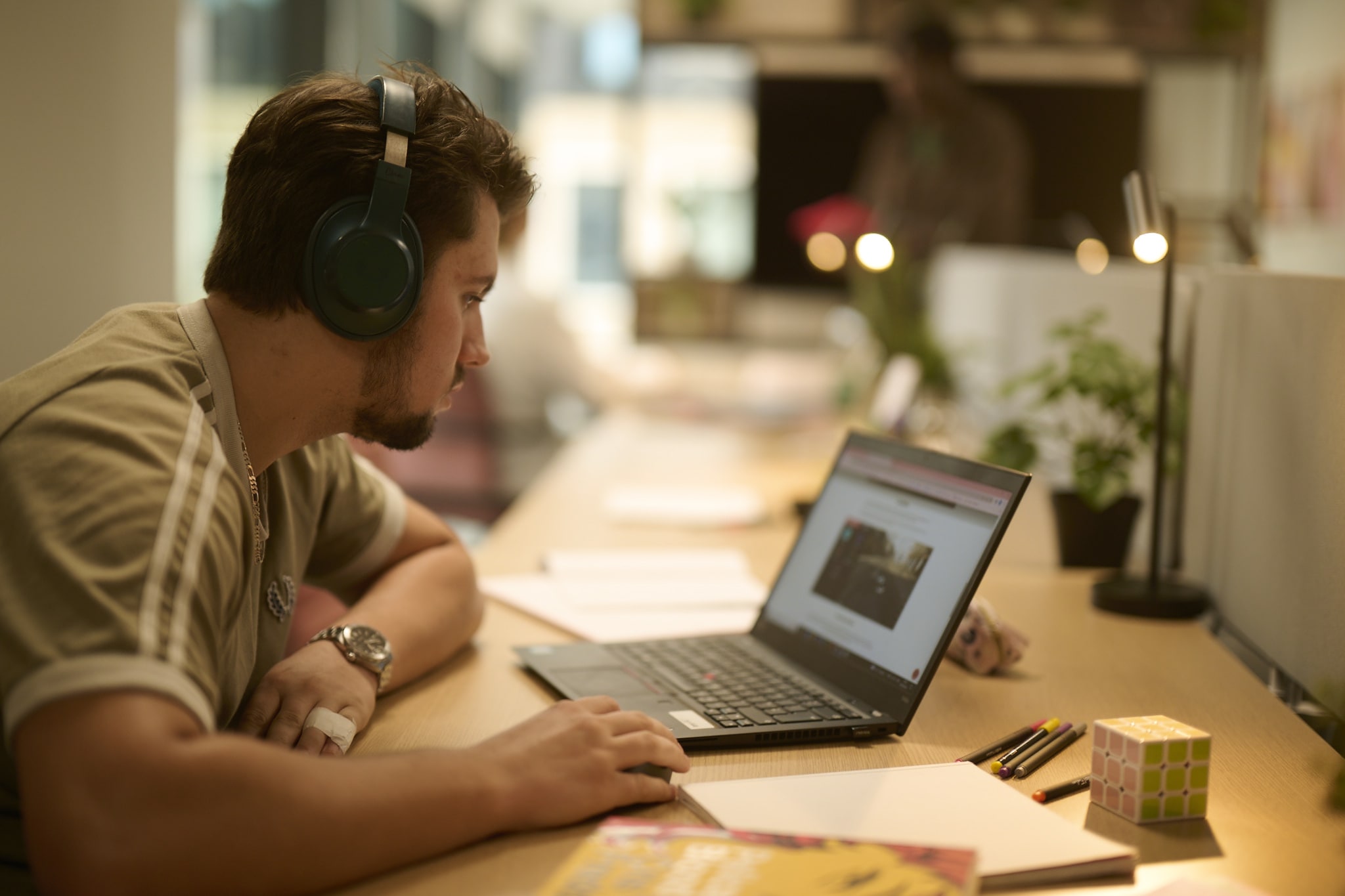Top 20 Tips to Study Smarter Not Harder
We all know that as students, we're often faced with a heap of information, tricky concepts, and looming deadlines. So, how do we study smarter, not harder?
Well, get ready because we're about to explore a treasure trove of tips and techniques that'll supercharge your study game. From setting clear goals and staying organised to diving into active learning and making tech your ally, these strategies are your secret weapons for becoming a study ninja.
Join us on this journey to unleash your full learning potential, and let's dive into how you can make every study session count, achieve better results, and truly understand the subjects that matter most to you.
Table of Contents:
- What does "studying" really mean?
- The 20 best tips to study smarter
- 1. Take care of yourself
- 2. Take good notes
- 3. Review regularly
- 4. Find a conducive environment
- 5. Create a study schedule
- 6. Stay organised
- 7. Set clear goals
- 8. Prioritise tasks
- 9. Break it down
- 10. Engage with the material
- 11. Use study techniques
- 12. Keep your mind engaged
- 13. Use technology wisely
- 14. Minimise distraction
- 15. Ask for help if needed
- 16. Quiz yourself
- 17. Teach others
- 18. Ask other students to share their knowledge
- 19. Go above and beyond
- 20. Trust in yourself
- Last-minute, life-saving tips
- Books to help you study smarter
- FAQs
What does “studying” really mean?
When your professors tell you to "study," they mean you should do this:
- Reviewing course materials: This means going over your textbooks, lecture notes, and anything else your professor gave you.
- Getting active: Be engaged with your material. Take notes, highlight what's important, and don't be shy to ask questions when you're confused.
- Practice, practice, practice: Completing your assignments and doing extra exercises is very important. It's like training for a sport; you need to practise to get better.
- Remember, but don't just memorise: You need to remember facts and concepts, but it's way better if you also understand why these things are true. Dig deeper and see how everything connects.
With the study tips below, we will help you to study effectively, that is to study in optimal conditions and to find smart ways to make sure you understand your course materials.
The 20 best tips to study smarter
1. Take care of yourself

Putting self-care first forms the bedrock of successful studying. Getting enough rest, eating well, staying hydrated, staying active, and giving yourself regular breaks ensure that both your body and mind are ready for learning. A positive attitude boosts productivity, and setting up rewards keeps you motivated. By taking care of yourself, you're creating the ideal conditions for focused and fruitful study sessions.
Read: How to be a Happy Student
2. Take good notes
Taking good notes is a vital part of studying smarter. It's like crafting a roadmap for your learning journey. These notes help you remember important information from lectures or readings, and when they're well-organised, they make it easier to grasp and retain complex concepts.
So, remember to take thorough and organised notes – they'll be your study companions!
3. Review regularly
Regularly revisiting what you've learned is another essential aspect of effective studying. It's like reinforcing the foundation of a building to make it stronger. By going back to your notes and materials regularly, you help cement that knowledge in your mind.
This not only helps you remember things better but also makes it easier to connect the dots between different ideas. So, remember to review regularly—it's how you supercharge your learning process.
4. Find a conducive environment
Seeking out a suitable study environment is another key component of smart studying. Think of it as finding the perfect setting for a productive task. A quiet, well-lit, and comfortable space can help you focus better. And remember, if your current study spot isn't working for you, don't hesitate to switch things up and find a better one. The right environment can significantly enhance your learning experience.
5. Create a study schedule

Crafting a study schedule is like charting a course for success. It helps you organize your study time effectively. Make sure to set aside specific slots for intense revision sessions. These concentrated study periods allow you to go deep into the material. And if you find that your initial schedule isn't quite hitting the mark, don't be afraid to adjust and fine-tune it as needed. A well-structured study schedule is your roadmap to achieving your learning goals.
6. Stay organised
It means keeping track of your assignments, deadlines, and study materials. It's also about structuring your notes and resources so that you can easily find what you need. Staying organised is crucial, especially when preparing for exams or major assignments. It ensures you stay on top of your tasks and can quickly access the information you require. If you notice things getting a bit messy, take the time to tidy up and reorganise – it will keep your study process running smoothly.
7. Set clear goals
This gives your study sessions a clear purpose and direction. When you set specific goals for what you want to achieve, you're more likely to stay focused and motivated. And establishing clear objectives helps you measure your progress and track your accomplishments. If you find yourself feeling lost during your study sessions, take a moment to set clear, achievable goals – they'll be your guiding stars on the path to successful learning.
8. Prioritise tasks
Prioritising tasks is akin to sorting your to-do list by importance. It means tackling the most critical tasks first, like studying high-priority topics. This approach ensures you focus your energy on what matters most. Prioritise also working on your weak areas to improve them. By giving special attention to the topics or subjects you find challenging, you can strengthen your overall knowledge and skills. So, when you sit down to study, remember to prioritise wisely.
9. Break it down

Breaking it down is like turning a big puzzle into smaller, manageable pieces. When you face a large amount of material, like a hefty textbook or a complex topic, it can be overwhelming. Breaking it down means dividing that material into smaller, more digestible chunks. This makes it easier to tackle and understand. It's like eating a big sandwich one bite at a time. So, when you encounter something massive, take a breath, break it down into smaller sections, and tackle each piece systematically. It's a smart way to conquer even the most challenging subjects.
10. Engage with the material
Engaging with the material is like having a conversation with your learning materials. Instead of just passively reading or skimming, actively involve yourself in what you're studying.
This means taking notes, asking questions, and connecting ideas. Think of it as making friends with the material – the more you interact with it, the better you'll understand and remember it. So, don't just skim the surface; dive in, participate, and make the most of your study sessions by actively engaging with the material.
Read: Easiest & Hardest Universities to Get Into in the UK
11. Use study techniques
Using study techniques involves employing different strategies to make your study sessions more effective. One useful technique is using mnemonic devices, like acronyms or visual aids, to help remember information.
You can also practise retrieval, self-testing, and spaced repetition to reinforce your learning. Think of these techniques as tools in your learning toolbox. By using them wisely, you can enhance your understanding and retention of the material.
12. Keep your mind engaged
Keeping your mind engaged means staying actively involved and interested in what you're learning. Instead of letting your mind wander, stay focused on the task at hand. Switch between different subjects or topics to keep things fresh, and use various learning methods to challenge yourself. You could also watch videos online on the topic you are studying to take a break from your notes, and to help you understand them better.
By keeping your mind engaged, you'll prevent boredom and enhance your ability to absorb and retain information effectively.
13. Use technology wisely

Using technology wisely involves making smart choices about when and how to use digital resources during your study sessions. Technology can be a valuable aid for research, online courses, or organising your notes. But it's crucial to avoid distractions and stay focused on your study goals. Think of technology as a helpful assistant that can boost your learning when used wisely.
So, harness its potential, but remember to stay disciplined and keep your study sessions productive.
14. Minimise distraction
Minimising distractions means eliminating anything that can divert your attention from your studies. Avoid the temptation of social media and resist the urge to snack excessively. Turn off notifications, close unnecessary tabs or apps, and create a clutter-free workspace. This way, you can fully concentrate on your learning tasks and make the most of your study time.
15. Ask for help if needed
It's essential to recognise that everyone faces challenges in their learning journey, and seeking assistance is a smart move. Don't hesitate to reach out to your teachers, tutors, or classmates if you're struggling to grasp a concept or need clarification.
Remember, asking for help shows maturity and a commitment to understanding the material thoroughly. So, when you encounter difficulties, be proactive and ask for help – it's a sign of your dedication to learning and can lead to better outcomes.
16. Quiz yourself
Quizzing yourself is like being your own teacher. Instead of just reading or reviewing, actively test your knowledge by asking questions about the material. This method helps reinforce what you've learned and improves your memory recall. Think of it as a self-assessment tool that allows you to identify areas where you may need more practice. So, don't shy away from quizzing yourself!
17. Teach others

Explaining what you've learned to someone else helps reinforce your understanding of the material. It forces you to clarify concepts and present them in a way others can grasp. Teaching can be informal, like explaining a topic to a friend, or more structured, like tutoring.
By teaching others, you not only help them but also solidify your own learning. So, don't hesitate to become a teacher—it's a win-win for both you and those you teach.
18. Ask other students to share their knowledge
Asking other students to share their knowledge is like tapping into a treasure trove of insights. Don't hesitate to reach out to your peers and discuss what you're learning. They may have different perspectives, study tips, or explanations that can deepen your understanding of the material. Collaborative learning can be incredibly enriching, as it allows you to benefit from the collective wisdom of your classmates.
19. Go above and beyond
Going above and beyond in your studies is like aiming for excellence, not just meeting the minimum requirements. It means going the extra mile, seeking additional resources, and exploring deeper aspects of a topic. Don't settle for just what's required; strive to understand the subject thoroughly.
This approach not only enriches your knowledge but also sets you apart as a dedicated learner. So, when you're studying, consider going above and beyond—it's a path to greater expertise and success.
20. Trust in yourself
Last but not least, trust in yourself. Believe in your ability to learn and succeed in your studies. Confidence in your own potential is a powerful motivator. When you trust in yourself, you approach your studies with a positive attitude and resilience, even when faced with challenges.
Remember: learning is a journey, and self-confidence plays a crucial role in your progress. So, as you embark on your study sessions, trust in your capabilities, you can do it!
Last-minute, life-saving tips
Studying at the last minute? We've got you covered. Crunch time before an exam can be stressful, but with the right strategies, you can maximise your study efficiency and nail your exams. Here are some life-saving tips and techniques:
- Focus on key topics: Quickly review the main concepts and areas that are difficult for you.
- Active learning: Use worksheets, practice problems or explain topics to someone else.
- Create study guides: Make a brief summary of each topic for quick review.
- Mock tests: Practise answering questions under timed conditions.
- Get enough sleep: Avoid studying through the night; sleep helps to consolidate memory.
- Nutrition and hydration: Eat healthy and stay hydrated to maintain concentration.
- Regular breaks: Take short breaks to maintain concentration, such as the Pomodoro Technique.
- Minimise distractions: Choose a quiet environment and limit phone use.
- Past exams: Review past exams to understand the format of the questions and the most frequently tested topics.
Remember, while these methods are helpful in a pinch, consistent study habits are key to long-term academic success.
Books to help you study smarter
The following books inspired us to put together the list of study tips above:
- Make It Stick: The Science of Successful Learning by Peter C. Brown, Henry L. Roediger III, Mark A. McDaniel
- The Only Study Guide You'll Ever Need: Simple tips, tricks and techniques to help you ace your studies and pass your exams! by Jade Bowler
- The Study Skills Handbook by Stella Cottrell
FAQs
Q: How can you study more effectively?
A: Effective studying involves a mix of good time management, choosing the right environment, employing diverse learning techniques, and regular review sessions to reinforce learning.
Q: How can you study effectively for exams in a short time?
A: Focus on understanding key concepts rather than memorising details, create a condensed study guide, and use active learning techniques like practice tests and flashcards. Prioritise topics based on their importance and the amount of time available.
Q: How can you make studying more fun?
A: Incorporate engaging methods like educational games, study groups, or applying real-world examples to the material. Breaks and rewards can also make the process more enjoyable!
Q: What are some techniques to improve concentration while studying?
A: To enhance concentration, study in a distraction-free environment, use tools like noise-cancelling headphones, and practice mindfulness or meditation to train your focus.
Q: How can you manage study time alongside other commitments?
A: Develop a realistic study schedule that balances academic tasks with personal and professional responsibilities. Utilise time management tools like calendars or apps to keep track of deadlines and commitments.
Q: How can you stay motivated during long study periods?
A: Setting clear goals, tracking progress, rewarding accomplishments, and maintaining a healthy lifestyle with proper sleep, exercise, and nutrition can help sustain motivation. Do not forget the basics!

